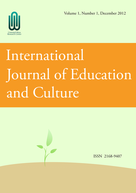


Volume 12 Issues 3-4 (2023-12-31)
Volume 12 Issues 1-2 (2023-06-30)
Volume 10 Issues 1&2 (2021-06-30)
Volume 9 Issues 3&4 (2020-12-31)
Volume 9 Issues 1&2 (2020-06-30)
Volume 8 Issues 3&4 (2019-12-31)
Volume 8 Issues 1&2 (2019-06-30)
Volume 7 Issues 3&4 (2018-12-31)
Volume 7 Issues 1&2 (2018-06-30)
Volume 6 Issues 3&4 (2017-12-31)
Volume 6 Issues 1&2 (2017-06-30)
Volume 5 Issues 3&4 (2016-12-31)
Volume 5 Issues 1&2 (2016-06-30)
Volume 4 Issues 3&4 (2015-12-31)
This paper focuses on using technology to support mathematics instruction. Technologies such as computers and calculators are widely used in the teaching of mathematics. The educators advocate the use of these tools to reduce tiresome computations and tasks so that class time can be more effectively used for learning mathematics. The purpose of this review is twofold: (1) to explore the use of computer and calculator as tools for the mathematics teaching and (2) to analyze their effects on the students’ achievement in algebra and calculus. This review of literature from 1990-2012 also addresses the implication of curriculum in an age of computer algebra systems.
This article addresses an important issue of what will happen when different cultures and philosophies meet in higher education. Specifically, it describes how a professor with a western Socratic-based philosophy and her peer with an eastern Confucius-based philosophy internationalize curriculum. A Canadian Socratic-based constructivist and a Chinese Confucius-based traditionalist compare their attempts to internationalize curriculum in the same college of education, a college with a predominantly white, middle class American student population. Though the professors approached education from a different educational framework and different philosophical understanding, both applied curriculum internationalization principles to their teaching to better prepare teacher candidates to meet the demands of our growing global classroom. The authors discuss the importance of internationalizing curriculum, whether the initial philosophy of education is dialectic or didactic. They give examples of the struggles that prompted the adoption of internationalization and detail the changes made. The authors propose that the demands of the classroom and the world invoke more attention to curriculum internationalization practices as they relate to the preparation of teachers.
Some scholars hypothesize that the privileging of White culture in science classrooms and the negative stereotypes of Blacks (Nasir, 2003) in dominant culture hinder Black students participation and invariably achievement in science. Further, research posits that the establishment of White culture as the cultural norm of science classrooms may create conflict between Black students’ development of a science identity (Blickenstaff, 2005; Brown, 2004; Gilbert & Yerrick, 2001). This theoretical framework synthesizes the work of Gee (2001), Clewell & Braddock (2000), and Wenger (1999) to describe a term I call the ‘science affinity-identity’, which denotes the level of students’ affinity with the community of science. This construct is based on students’ sense of compatibility with science, their self reported achievement in science, the perceived utility of science in their lives, and their expressed liking of science. This science affinity-identity directly impacts students’ degree of participation in science. Students may enjoy a high level of science achievement and express a strong interest in science, they may view the identity of a scientist as incompatible with their ethno-racial, gender, or other identities. The higher students’ science affinity-identity, the more likely they view themselves as science insiders, actively engaging with the scientific community.
This study is about gatekeeper training programs that have been implemented on university campuses in response to the need for suicide prevention efforts due to the significant increases in the number and severity of students in psychological distress. It examined post assessments following suicide prevention training. Specifically, it investigated the effects of gender and race on participants’ knowledge of suicide and confidence in assisting at-risk individuals as well as the significant predictor(s) of their knowledge of suicide. The results show that there was a significant gender effect on their knowledge of suicide; and their evaluation of the training program was a significant predictor of their knowledge of suicide. Further, there was a significant relationship between their knowledge of suicide and confidence in assisting at-risk individuals.
2ND Untested Ideas International Research Conference June 27 – 29, 2014 The Sheraton Rhodes Resort, Rhodes, Greece